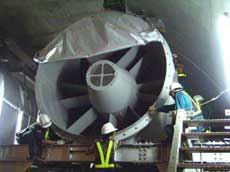Haivan Pass Tunnel
CONSTRUCTION
PROJECT
Welcome to Our Site!
News and Events > Public Media
As tunnel pass nears completion, contractor looks to other projects
(Date: November 11, 2004. Source: Vietnam News)
Installing the ventilation system at the Hai Van Tunnel. — VNS Photo Thanh Hai
DA NANG — Workers and engineers, close to finishing the new Hai Van Tunnel Pass, already have their eyes on future projects.
The employees of the Civil Engineering Construction Corp. No. 6 (CIENCO 6) expect to complete the mountain tunnel pass later this year.
"A large number of Cienco 6’s engineers and workers are expected to take part in other projects to be undertaken by Hazama," reported deputy director of the Hazama - Cienco 6 joint venture, Tran Thanh Minh.
The head of the Japanese Hazama Company in Viet Nam, Hideo Matsumoto, held a press conference on Saturday to announce that the construction of the northern section of the tunnel is nearing completion and will be transferred to the project owner on December 15.
Possible Official Development Assistance (ODA) funded projects to be taken on by Hazama in the future may include the Dai Ninh hydro-electric power plant in Lam Dong Province, Ta Trach hydro-electric plant in Thua Thien-Hue, and the Thu Thiem Underground Tunnel in HCM City.
The Hai Van Tunnel Pass contract, won by Hazama-Cienco 6, consists of a 3,857m long 80sq.m main tunnel, a 3,857m long 15sq.m evacuation tunnel, seven cross-passageways, and nearly 2,000m long ventilation ducts.
"We could say that we have brought the northern section of the tunnel project to a successful completion," said Matsumoto. "The project’s success will help strengthen the co-operative links between Hazama and Cienco 6 and at the same time promote co-operation between Japan and Viet Nam."
Director of the Hazama - Cienco 6 Joint venture, Masashi Kuroda, said they first encountered difficulties after digging just 400 metres. Underground water overwhelmed the tunnel, forcing them to pump out 2 million cu.m of water.
In April 2003, the joint venture encountered difficulties when the owner of the project — the Ministry of Transportation — demanded that the two sections of the tunnel be linked by October of last year.
Kuroda said they had to dig and then pave 158 metres of the tunnel every month to reach their target.
Due to the vast experience gained from working on the site, about 50 Vietnamese staff have been appointed to positions previously held by engineers from Thailand, Indonesia and the Philippines.
Hazama has also transferred the operation of the tunnel and technology management into Vietnamese hands.
Hazama entered Viet Nam in 1961 and has taken part in more than 100 projects. Among them, Matsumoto said, are the Da Nhim Hydro Power Plant and Cho Ray Hospital, adding that these are "the most successful projects funded by ODA loans."
"It’s a great honour for us to undertake the Hai Van Tunnel Project, as it is the largest tunnel in Southeast Asia and a landmark in the history of Viet Nam’s transportation sector," said Hazama head, Matsumoto.
The tunnel project required an investment of US$251 million; 85 per cent of the capital came from ODA and was provided by the Japanese Bank for International Co-operation. Located about 1,000km north of HCM City, some 2,500 vehicles used the pass each day in 1998, and this figure is expected to rise to 7,000-8,000 vehicles per day by 2005.
The project will turn the 21-km pass into a 12-km road and tunnel complex.
Despite the project’s success, Hazama - Cienco 6 administrators complained of some local workers’ weaknesses.
In addition to the 200 engineers and workers from Cienco 6, the project had to sign labour contracts with 500 unskilled workers.
According to deputy director Minh, these newly recruited workers’ lack of skill and unruliness caused management troubles.
He added that these poorly trained workers would not be eligible for future employment opportunities when the Hai Van Pass Tunnel becomes operational in May 2005. — VNS
This homepage is presented by the Consultant Team
Any further question should be forwarded to Webmaster or Consultant Team
